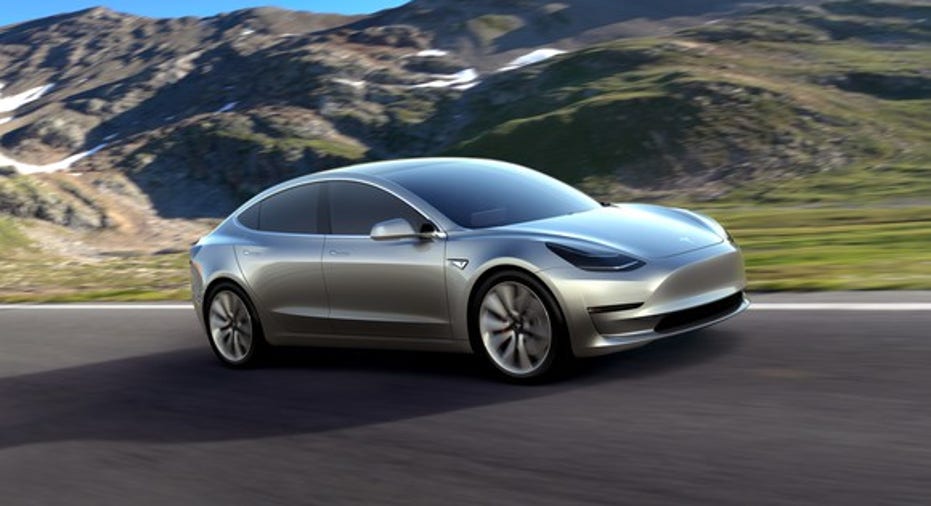Why Tesla's Model 3 Production Plans Could Go Awry

Tesla (NASDAQ: TSLA) is gearing up to put its first true mass-market product, the Model 3 sedan, into production. If all goes well, the first production Model 3s will roll down a brand-new assembly line in July.
It's a huge step for the Silicon Valley automaker. The Model 3 will be produced in much higher volumes than anything that Tesla has tried to build so far. And because it's a mass-market product, the quality expectations will be extraordinarily high.
We know that Tesla has been spending heavily on an elaborate revamp of its Fremont, California factory as it gears up to put the Model 3 into production. Last week, CEO Elon Musk gave us a look into how the company plans to ramp up its production line.
Tesla's upcoming Model 3 sedan, shown in concept form last year. Image source: Tesla.
A gradual ramp-up through the first three months of production
"I feel pretty confident that we should get there by the end of this year, to 5,000 a week," Musk told analysts during Tesla's fourth-quarter earnings call. Musk went on to outline the production schedule that Tesla has given its parts suppliers:
- 1,000 per week in July;
- 2,000 per week in August;
- 4,000 per week in September;
- 5,000 per week by the end of the year.
Keep in mind that that schedule is for parts deliveries to Tesla's factory in Fremont, California. As Musk pointed out, it will take time to turn those parts into finished cars as Tesla works to get its brand-new assembly line running -- and it'll take more time to deliver those cars to customers.
The "term-paper problem" that could throw off the schedule
But even factoring in those assumptions, Musk warned that the Model 3 ramp-up could be slowed further by what he called the "term-paper problem":
Tesla has set strict delivery dates with its suppliers, but Musk said that he knows that some number of them might well be late. Even if it's just 1%, those late parts could throw a big wrench into Tesla's ambitious production ramp-up schedule. Tesla would either have to wait for the supplier to deliver the parts, pay (a lot) extra for a rush order from another supplier, or try to make the parts itself, in-house. Any solution other than waiting for the original supplier risks introducing quality concerns -- something that Tesla really can't afford with the Model 3.
So does Tesla stand a chance of making its numbers?
It does stand a chance of making its numbers. But it's important to remember that there's a whole lot that can go wrong, and some of that probably will.
Like any automaker, Tesla depends on hundreds of different suppliers for thousands of different parts. Things happen: Sometimes, the first batches of parts for a brand-new model don't fit exactly right. Specifications and tooling are adjusted, and the supplier sends a better-fitting batch -- but that takes time.
The production line for Tesla's Model 3 will have much more automation than its current lines, Musk said. Image source: Daniel Sparks/The Motley Fool.
Remember also that Tesla's production line for the Model 3 will be brand-new, and it will incorporate much more automation than Tesla's existing line for the Model S and Model X. That presents more opportunities for snags that might cost a day or two here or there, all of which can add up.
Most of this will probably be sorted out before Tesla officially begins production of Model 3s for delivery to customers. But "most" isn't all, and Tesla's investors -- and customers -- will probably need to be patient as the company works through the process.
10 stocks we like better than TeslaWhen investing geniuses David and Tom Gardner have a stock tip, it can pay to listen. After all, the newsletter they have run for over a decade, Motley Fool Stock Advisor, has tripled the market.*
David and Tom just revealed what they believe are the 10 best stocks for investors to buy right now... and Tesla wasn't one of them! That's right -- they think these 10 stocks are even better buys.
Click here to learn about these picks!
*Stock Advisor returns as of February 6, 2017
John Rosevear has no position in any stocks mentioned. The Motley Fool owns shares of and recommends Tesla. The Motley Fool has a disclosure policy.



















